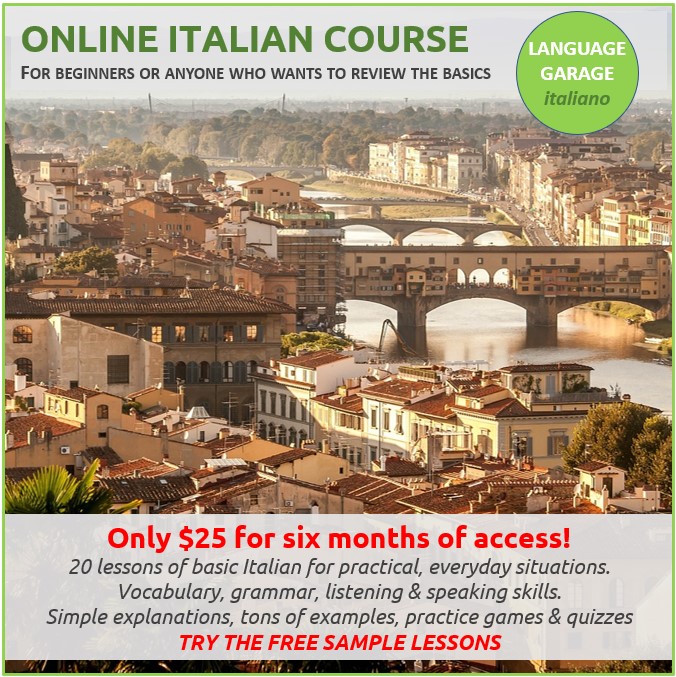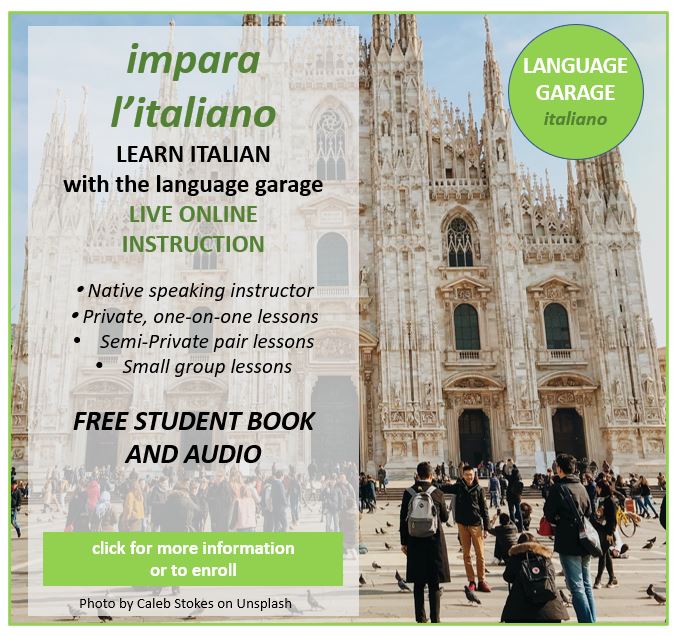Photo by Afif Kusuma on Unsplash
Ciao! This post is a free sample of a lesson from our online Italian course. The beginner’s course includes all of the vocabulary from our basic mini-lessons, with full audio support by native speakers. The online course also includes simple explanations of basic Italian grammar, plenty of examples, and loads of practice exercises, quizzes, and games. You can check out sample lessons or enroll in the online course here.
In this post we’ll look at Italian question words and how to use them.
Sì, No: Yes, No
Let’s start with some general vocabulary and expressions related to questions: una domanda a question; sì yes; no no; forse maybe; o or.
- Ho una domanda.
I have a question. - Posso farti una domanda?
Can I ask you a question? - Non lo so.
I don’t know. - Non ne sono sicuro/a.
I’m not sure.
- Sono sicuro/a.
I am sure. - Questo è tè o caffè?
Is this tea or coffee? - Vuoi acqua o succo?
Do you want water or juice? - Questo è il tuo/il Suo albergo?
Is this your hotel? - Sì, è il mio albergo.
Yes, it’s my hotel. - No, non è il mio albergo.
No, it’s not my hotel.
Cosa? What?
To ask what, use (che) cosa. Notice that cosa become cos’ if the next word starts with a vowel, so cos’è is what is?
- Cos’è questo?
What is this? - Cosa stai facendo?
What are you doing?
Chi? Who?
To ask who, use chi. In English, you can split a preposition like with from who, as in who are you traveling with? In Italian, you can’t do this, so the word order is more like with who(m) are you traveling?
- Chi è quello?
Who is that? - Con chi viaggi?
Who are you traveling with?
Dove? Where?
To ask where, use dove. Before a word that starts with a vowel, for instance è, dove becomes dov’. So dov’è is where is.
- Dov’è il bagno?
Where’s the bathroom? - Dove abiti/abita Lei?
Where do you live? - Dove stai andando?
Where are you going? - Di dove sei?
Where are you from?
Quando? When?
To ask when, use quando. A related question is a che ora? at what time?
- Quando arrivi/arriva Lei?
When do you arrive/leave? - Quando parti/parte Lei?
When do you leave? - Quando parte/arriva il treno?
When does the train leave/arrive? - Quando apre/chiude il negozio?
When does the store open/close? - A che ora inizia il film?
At what time does the film start?
Come? How?
To ask how, use come.
- Come si dice <hello> in italiano?
How do you say <hello> in Italian? - Come vai a lavoro?
How do you go to work? - Com’è?
What does he/she look like? (Lit, how is he/she?) - Come ti chiami?
What’s your name? (Lit, how are you called?)
Quanto? How much?
To ask how much, use quanto. Note that quanto changes depending on the gender of the noun it’s linked to: quanto, quanta, quanti, quante. The singular forms are translated as how much, and the plural forms as how many.
- Quanto costa questo?
How much does this cost? - Quante persone?
How many people? - Quanto tempo abbiamo?
How much time do we have? - Quanta acqua vuoi?
How much water do you want?
Perché? Why?
To ask why, use perché. The same word means because in answers.
- Perché sei qui?
Why are you here? - Perché è triste?
Why is he/she sad? - È triste perché sta piovendo.
He/She is sad because it’s raining.
Do you want to learn Italian?
Check out our other posts on Italian language, culture, and more. And if you’re looking for convenient and affordable live Italian lessons with a real teacher, check out The Language Garage. Our lessons are given online in a virtual classroom, so it doesn’t matter where you live or work – we can come to you. And we have flexible options, with a free trial so that you can decide if there’s a fit. Check us out!






